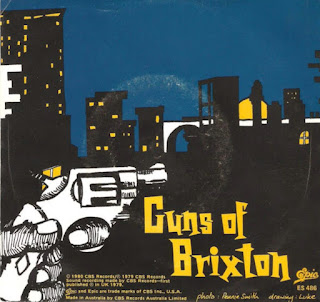THE CLASH - CLAMPDOWN / THE GUNS OF BRIXTON
Released: December 14, 1979, single: 1980 (Australia)
Album: London Calling
CLAMPDOWN
"Clampdown" is a track by the Clash from their 1979 album "London Calling." Originally titled "Working and Waiting" as an instrumental, it evolved into a song addressing the disillusionment of youth and the call to resist societal norms. The term 'clampdown' encapsulates the oppressive forces of the Establishment, reflecting the reactionary voices of the 1970s advocating for government and law enforcement crackdowns on various social groups deemed disruptive or threatening to the status quo in the UK.
"Clampdown" was inspired by Joe Strummer's view that capitalism posed a threat to humanity, a sentiment sharpened by the Three Mile Island nuclear accident in 1979. This incident, along with other societal issues, fueled Strummer's lyrics, which evolved into a broader critique of the system that forces people to conform and work for oppressive forces. Musically, the song showcases the Clash's diverse influences, blending rock, funk, and disco into a fiery anthem that remains relevant and powerful. It's regarded as one of the standout tracks on their iconic album "London Calling" and remains a highlight of their live performances.
Strummer's impassioned delivery of his motto, "Let fury have the hour / Anger can be power / Do you know that you can use it?" sets the tone for "Clampdown," a song that seamlessly blends punk energy with R&B influences. The opening line, "Taking off his turban, they say is this man a Jew?" is often misconstrued as anti-Semitic. Joe Strummer intended to critique nationalistic stereotypes and irrational suspicion of foreign peoples, particularly in the context of the rise of far-right parties like the National Front. Mick Jones's guitar work during the R&B bridge is reminiscent of Morse code. Topper Headon's precise drumming and Paul Simonon's dynamic bass lines further elevate the song's intensity.
"Clampdown" made its live debut in Minneapolis in September 1979 and remained a staple of The Clash's setlist until their breakup in 1985. The song was beloved by both the band and their fans, earning acclaim for its energetic performances. A notable live recording from the Lewisham Odeon in February 1980 was included on the greatest hits compilation "The Essential Clash." This live footage was also used in the music video for the song and featured in the 2002 documentary film "Westway to the World”.
THE GUNS OF BRIXTON
"The Guns of Brixton" is a track from the Clash's iconic album "London Calling." Bassist Paul Simonon, a native of Brixton, South London, took the lead in both writing and singing this compelling piece. Unlike the typical Clash compositions written by Joe Strummer and Mick Jones, Simonon's contribution added diversity to the band's repertoire. Paul Simonon penned "Guns of Brixton" with a straightforward realization in mind: songwriters often rake in more earnings than their bandmates. The song delves into the gritty underworld of Brixton, portraying the struggles and tensions of its inhabitants, with a distinct reggae influence reflecting the cultural backdrop of the area.
"Brixton was the site of race riots in 1981 and again in 1985. This song captures the alienation many citizens of Brixton felt leading up to the riots. The central plot revolves around Ivan, an anti-hero character from the popular film The Harder They Come. In urban South London Ivan navigates a life where survival is paramount, reflecting the tough realities faced by many in Brixton. The lyrics also touch on being on the wrong side of the law ("When the law break in, how you gonna go? Shot down on the pavement, or waiting on death row"), highlighting the precariousness of existence in such an environment."
"The Guns of Brixton" may not have been originally released as a single, but its enduring appeal prompted a re-release in 1990. This revamped version, titled "Return to Brixton" and remixed by Jeremy Healy, breathed new life into the track. Released in various formats including CD single, 7-inch vinyl, and 12-inch vinyl, "Return to Brixton" made its mark on the UK Singles Chart, reaching #57. It's an amusing twist that a typo on the CD sleeve notes led to Paul Simonon's name being misspelled as Paul Simon, inadvertently suggesting a collaboration with the renowned Paul Simon of Simon & Garfunkel fame, despite the latter having no involvement in "The Guns of Brixton." The original version of the song was released as the B-side of “Clampdown”'s Australian single.
It's remarkable how the bassline from "The Guns of Brixton" found new life when sampled in the Beats International hit "Dub Be Good To Me" by Norman Cook, also known as Fatboy Slim. This unexpected resurgence led to Simonon receiving royalties for his bassline, marking a surprising turn of events for his first song. Despite the initial shock, Simonon found it reassuring and even met with Cook to come to an arrangement regarding the sampling. "Dub Be Good To Me" topped the UK Singles Chart in March 1990 for four weeks.









Cap comentari:
Publica un comentari a l'entrada